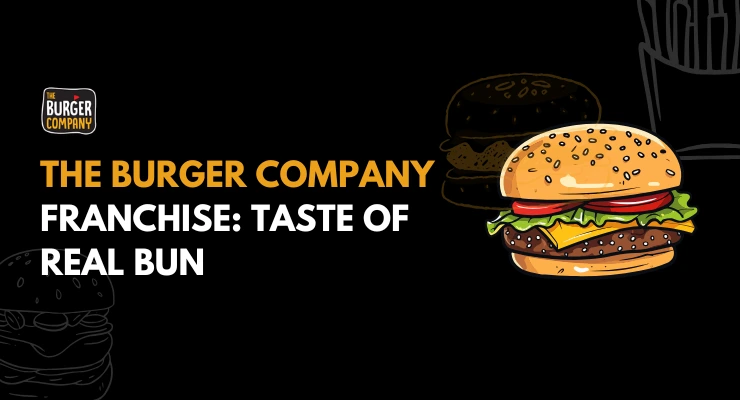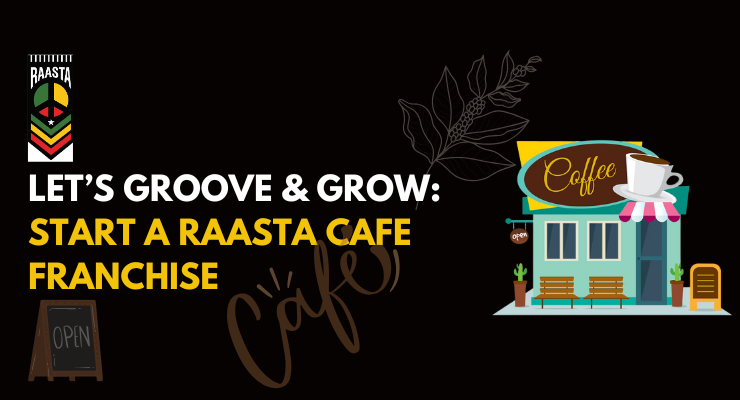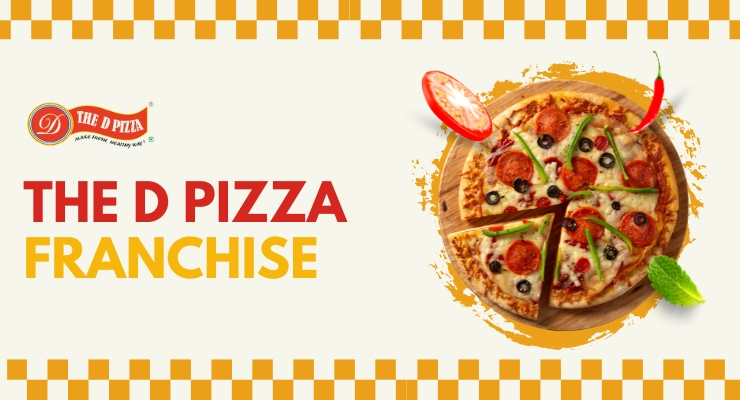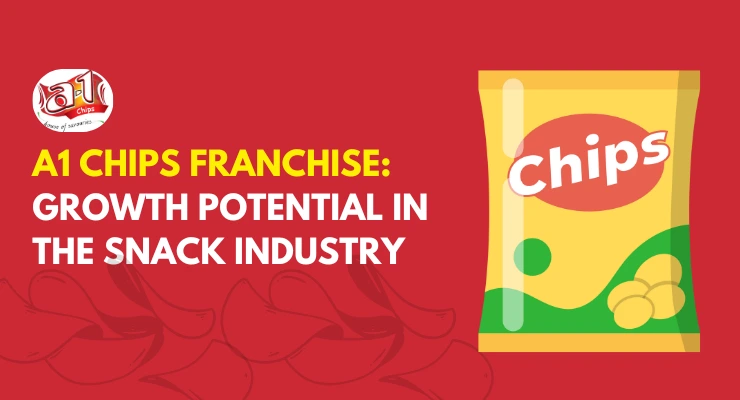
The Burger Company Franchise: Guide to Costs, ROI & Benefits
The fast-food industry might have existed in India a few years ago, but it is now literally on fire, with burgers becoming the most preferred meal by homebodies and all kinds of blokes.
Amongst all this fast-rising turbo-jet, one name that has caught the fancy and appetite of Indian audiences is The Burger Company franchise mating of affordability, quality food, and lively spaces brought into life in a given space.
This makes The Burger Company shine as the biggest burger franchise in India by women and very much founded by India visionary: Ms Neelam Singh.
Under her direction, the company has scaled heights to have over 130 outlets in more than 50 cities, providing a huge market for fine dining at reasonable prices.
The focus of the brand also lies in tier 2 & 3 cities where major chains have not come, making it a hot favourite among the eager clientele for the modern café-style dining experience.
The Branded Image of ‘The Burger Company’ has everything from students and young professionals craving a famous hangout for Instagram to average families just looking for a tasty meal on a budget-they’re on one roof, making it a sought-after investment for budding entrepreneurs.
About The Burger Company Franchise
Historical Background and Origins
The Burger Company was established as a remedy to the quick-service restaurant (QSR) void in tier-2 and tier-3 smaller cities.
Ms. Neelam Singh, the founder herself, points out that there is a clear demand for something modern and inviting in terms of eating space in towns besides metropolitan cities.
Putting this together with her food and creativity passion, she engineered a brand that answers quality, economy, and inclusivity.
Key Milestones
- Genesis: The Burger Company franchise has grown from one outlet that focused on high-quality burgers, into something very much affordable.
- Rapid Growth: Emerged among the most recognized QSR brands with 130 plus outlets within a few years.
- Market Leadership: The brand was heralded as the Flag bearer for developing modern café experiences in small cities.
- Customer-Centric Innovations: The brand also boasts of having a gaming zone as part of its trendy interiors and unconventional display of food.
Current Market Presence
The Burger Company’s decision to strategically position itself across tier 2 and tier 3 cities has proven a lot in bringing customers to the devoid of modern QSR experience areas.
Presently in its position in India concerning the brand, its growth projections do suggest that it should also eye on the potential horizon of international expansion in the near future.
Main Products and Services
The menu is therefore made ready with several items for different tastes using quality and affordability.
- Core Products: Signature veg and non-veg burgers with various innovative flavours.
- Side Dish: Crunchos, fries, momos, and other snacks to have a complete experience.
- Comfort Foods: Popular options such as pizzas, grilled sandwiches, pasta, and desserts like waffles.
Also read: Dominos Pizza Franchise: Guide to Apply, Cost, Profit and Margins
Key Details of the Franchise
Company Name and Sector
- Name of Brand: The Burgers Company
- Industry Domain: Quick Service Restaurant (QSR) specializing in contemporary café-style dining.
Range of Investments and Expenses
The Burger Company franchise comes with low to moderate investment which is fairly accessible for both first-time entrepreneurs or even serious investors willing to expand their portfolios.
Profit Margins and ROI
- Profitability: Gross Margins stand between 40 and 50%, owing to higher income through economies of scale and better supply chain efficiency.
- Return on Investment (ROI): Normally achieved within 1a 2 to 18 months period, depending on the location and efficiency of management.
Space or Layout Requirements
- Café Model: Minimum space of 300 500 sq. ft. Larger setups can incorporate gaming zones and so on.
- Ideal Locations: Areas with high footfall such as commercial streets, and shopping malls are preferred locations for this venture.
Product/Brand Range
Menu Features
The complete menu is diversified into local and international tastes to bring a different clientele from different walks of life.
- Burgers: Own recipes for both veg and non-vegetarian burgers, making it appealing to all palates.
- Snacks and Sides: Popular items like fries, momos, and Crunchos are well suited to dine-in and takeaway.
- Complete Meals: The entire offering of pizzas, pasta, and grilled sandwiches makes an entire meal possible.
- Desserts: Lovely items like waffles are bound to attract younger customers as well as families.
Unique Selling Points (USPs)
- Localized at its Base: Burgers and sides created for Indian taste buds with spicy masala flavourings.
- Aesthetics in Touch: Both food displays and interiors are designed for buzzing into social media.
- Value additivity: Innovative features such as gaming zones make the retail outlet more fun for younger consumers.
Differentiation in the Market
The Burger Company franchise focuses on tier 2 and tier 3 cities which are completely unaccounted areas for premium QSR brands.
The Burger Company Franchise Models
Kiosk Model
- Description: Very well suited to offer compact and effective solutions for high footfall locations-example: malls airports metro stations.
- Investment: Lesser cost since it requires very little space.
- Benefits: Faster ROI and with lesser operational complexities.
Full-Store Model
- Description: Full-fledged outlets that serve the complete menu along with other value-added dining experiences.
- Investment: Requires high space and infrastructure but generates higher revenues.
- Advantages: Leaving space for things like a gaming zone or seating for customers.
Cost Breakdown of The Burger Company Franchise
The burger company franchise cost can vary in these parameters:
- Franchise Fee: Includes brand licensing, training, and base support.
- Infrastructure: It incorporates interior, equipment, and utility costs.
- Inventory: Initial stock of ingredients and packaging materials.
- Marketing: Local promotions and brand campaigns.
Overall Investment Cost
The entire investment amount generally fluctuates between 20 to 30 lakh, thereby having a competitive edge in the QSR segment.
Profit Margins and ROI of The Burger Company Franchise
High Profitability
The burger company franchise profit margins would be from 40-50%, thereby ensuring very healthy returns for a franchisee.
ROI
The Timeline Most franchisees would be able to get ROI on their investments within the period of 12-18 months with the plan of proper location selection coupled with operational efficiency.
Long-Term Prospects
The ever-increasing trend of café-style dining ensures that there is constant demand and profit generation, particularly in developing markets.
Space Requirements
Kiosk Set-Up
- Minimum Area required: 100-200 sq. ft.
- Requirements: Basic counter space and a small kitchen.
Full Store Set Up
- Minimum Area: 300 sq. ft. – 500 sq. ft.
- Additional Features: Dining area, gaming zone, kitchen and storage facilities.
Location Considerations
Proximity to schools, colleges, offices, or shopping malls can ensure higher footfall. It should be easily accessible and visible for walk-in customers.
Check out this: Guide to Chai Sutta Bar Franchise: Cost, Profit & How to Apply
Benefits of Investing in The Burger Company Franchise
Strong Brand Equity
The Burger Company franchise gives one the recognition of associating with a household name within the reach of customers from all over the country.
Operational Support
Extensive training, guidelines towards operations, and continuous support have all been put in place by the brand to ensure a franchise achieves its goals.
Advertising and Promotions
Enjoy the benefits of centrally run national campaigns and local promotional activities mainly focusing on inviting customers to various stores.
Scalability
All outlets across the region have the potential to be opened multiple times.
Market Trends and Growth Potential
Transformation in the QSR Industry:
- The emerging trends of changing lifestyles and consumption preferences are the forces driving the evolution of the Quick Service Restaurant (QSR) sector in India.
No longer merely an issue of convenience, eating out or ordering in has become part and parcel of the essential living today.
Social Media Effects:
- There are places such as Instagram and Facebook that amplify all demand for a pretty sight-seeing experience dining in a café style.
- Patrons turn more to food places with food and atmosphere that can be captured by sharing pictures.
Emergence of Tier 2 and Tier 3 Cities:
- The increased disposable incomes and aspirational lifestyles developing within these cities transform them into substantial markets for growth.
- Consumers in these areas are diversifying into modern dining options which had earlier been confined to the metros.
Addressing-the-Competition Position of the Burger Company franchise:
- Global dining trends fused with localized flavours transforming a large part of the spectrum.
- Wide-ranging menu offerings, span from serious burger enthusiasts to comfort food lovers.
- Gaming zones and “Instagrammable” presentations enhance that for young consumers.
Bridging Market Gaps:
- Underserved tier 2 and tier 3 cities are identified, where an upmarket hangout is few and far between, and developing loyalty as the first mover in those towns, providing quality that would be maintained over time.
Customer-Centric Approach:
- It is more than just the food; it should be more of a memorable experience.
- Delivers quality ambience with a dose of social integration to meet its mixed demand.
Prospects:
- With this rapid increase in the QSR industry, there are wide horizons for growth for brands like The Burger Company franchise.
- It’s all about innovative products and smartly targeted markets, and this indeed will serve the purpose of the brand’s long-term dreams.
Documents Required for The Burger Company Franchise Setup
- Identity Evidence: PAN card, Aadhaar card, passport or voter ID.
- Financial Evidence: Bank statements to validate investment capacity.
- Legal Clearances: GST registration, shop establishment license and food safety certification approval.
How to Apply for The Burger Company Franchise
To apply for the burger company franchise, one must follow these steps:
Submit inquiries: Fill out the inquiry form online or speak to someone from their support team.
Initial Review: Company representatives evaluate your profile and proposed location.
Approval: Approvals bring formal agreements signing.
Set up and Train: Begin the outlet setup with training for your team.
Launch: Open your franchise with full operational and marketing support.
FAQs
What is the total cost of owning a franchise of The Burger Company?
The investment amounts sum between ₹20 to 30 lakhs, which contact fees, infrastructure, and inventory.
What type of support do you provide The Burger Company Franchise?
The Burger Company is ready to provide site selection, training, supply chain, and marketing support.
Is there a limit on menu customization?
Though the core menu remains standardized, it allows some flexibility for offerings to be tailored to local tastes.
Can I open a franchise in a tier 2 or tier 3 city?
Definitely! The Burger Company franchise caters to those geographies where other chains can’t venture, so they are the right product for such locations.
What training will be given here?
The brand provides comprehensive training programs for its franchise owners and staff: Operations, food preparation, and customer service.
Is there a continuing royalty charge?
Yes, the franchisee pays a nominal royalty fee, which is a percentage of monthly sales.
What support does the brand offer during setup?
Site selection, interior design, recruitment of staff, training, and marketing strategies are all part of the assistance offered by the brand in setting up.
Is it possible to go for a multi-outlet?
Yes, the existing franchisees with a successful track record can look for more stores in their region.
Are there any restrictions in terms of menu customization?
While the core menu is still standardized, The Burger Company franchise allows adaptable offerings here and there to local tastes and preferences.
Which factors influence profitability?
Profitability largely depends on location, efficiency of operations, customer service, and marketing strategies.
Conclusion
This makes investing in The Burger Company franchise more than simply a fast-food outlet; this is to have an opportunity in an industry and brand that champions inclusivity, quality, and affordability.
The franchise’s focus on tier 2 and tier 3 cities and its innovative approach to QSR will guarantee a solid customer base and consistent demand.
The Burger Company franchise is thus profitable and encourages entrepreneurship by providing wider profit margins, considerable operational support, and a dependable business model.
For a new entrant as an investor or an experienced business owner, coupling with this energetic brand could set the way for him to prosper in the fast-growing fast-food sector.
However, The Burger Company promises not just beautiful burgers; it prides itself on creating wonderful experiences for customers, building the community, and being with a brand that is redefining the QSR landscape in India.












